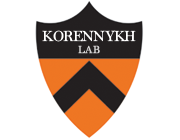
Alexei V. Korennykh

Alexei V. Korennykh
Dr. Alexei Korennykh is a Professor of Molecular Biology at Princeton University. He is interested in structural and cell biology of pathways mediated by dsRNA and by RNA-processing receptors that mediate innate immunity to viruses and bacteria, cell proliferation, tumor progression, obesity and response to stress caused by imbalance of protein folding. Dr. Korennykh received his BS degree in Chemistry at Moscow State University (Russia). During his PhD work with Joe Piccirilli at the University of Chicago (1999-2005), he focused on recognition of RNA and eukaryotic ribosomes by enzymes that stop translation via structure-specific modification of large ribosomal RNA. For his postdoctoral work (2006-2011), he joined the laboratory of Peter Walter at University of California, San Francisco (UCSF). At UCSF he worked on a signaling mechanism by which cells deal with protein misfolding. This mechanism is called Unfolded Protein Response and involves upregulation of hundreds of protein folding genes. In some eukaryotic cells, such as yeasts, the entire UPR program is controlled by a single receptor kinase/ribonuclease Ire1 in the membrane of endoplasmic reticulum (ER). Dr. Korennykh found that Ire1 is activated by assembling into a high-order complex, co-developed synthetic small molecule modulators of Ire1, and determined the crystal structure of this high-order complex with a synthetic small molecule modulator bound. This work received UCSF Dean's 2010 Postdoctoral Prize and served as the basis for two international patent applications. His PhD and postdoctoral work was supported by the Burroughs Wellcome Fund and by The Jane Coffin Childs Memorial Fund for Medical Research. Dr. Korennykh's current work focuses on structural biology of the OAS/RNase L axis of the innate immune system and is supported by NIH (R01), Princeton University Office of Technology Management, Sydney Kimmel Foundation, and Burroughs Wellcome Fund.
Accolades
|
2014 |
Burroughs Wellcome Fund Award |
|
2014 |
Sidney Kimmel Foundation Award |
|
2011 |
General Biology Research Award, 6th Annual Awards, BioMed Central (London) |
|
2010 |
UCSF Dean’s Postdoctoral Research Prize and Lecture |
|
2007- 2010 |
Jane Coffin Childs Postdoctoral Fellow |
|
2007 |
Cancer Research Institute (CRI) Postdoctoral Fellowship |
| 2001- 2003 |
Burroughs Wellcome Graduate Fellow |
|
1995
|
George Soros International Scholar (ISSEP) |

